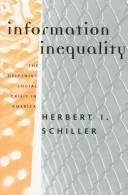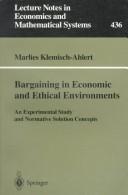| Listing 1 - 10 of 81 | << page >> |
Sort by
|
Book
ISBN: 9781785609442 1785609440 Year: 2016 Volume: 44 Publisher: Bingley: Emerald,
Abstract | Keywords | Export | Availability | Bookmark
 Loading...
Loading...Choose an application
- Reference Manager
- EndNote
- RefWorks (Direct export to RefWorks)
Multi
ISBN: 9780748641376 9780748638697 0748638695 0748641378 0748652817 1282703129 9786612703126 Year: 2009 Publisher: Edinburgh: Edinburgh University Press in association with The Aga Khan University,
Abstract | Keywords | Export | Availability | Bookmark
 Loading...
Loading...Choose an application
- Reference Manager
- EndNote
- RefWorks (Direct export to RefWorks)
Luck egalitarianism is a family of egalitarian theories of distributive justice that aim to counteract the distributive effects of luck. This article explains luck egalitarianism's main ideas, and the debates that have accompanied its rise to prominence. There are two main parts to the discussion. The first part sets out three key moves in the influential early statements of Dworkin, Arneson, and Cohen: the brute luck/option luck distinction, the specification of brute luck in everyday or theoretical terms and the specification of advantage as resources, welfare, or some combination of these. The second part covers three later developments: the democratic egalitarian critique of luck egalitarianism, the luck egalitarian acceptance of pluralism, and luck egalitarian doubts about the significance of the brute luck/option luck distinction.
Philosophy --- Equality. --- Distributive justice. --- Political science --- Philosophy. --- Equality --- Distributive justice --- Social contract
Book
ISBN: 9780691171975 9780691255514 0691255512 Year: 2024 Publisher: Princeton, N.J. Princeton University Press
Abstract | Keywords | Export | Availability | Bookmark
 Loading...
Loading...Choose an application
- Reference Manager
- EndNote
- RefWorks (Direct export to RefWorks)
"Economic inequality is one of the most daunting challenges of our time, with public debate often turning to questions of whether it is an inevitable outcome of economic systems and what, if anything, can be done about it. But why, exactly, should inequality worry us? The Greatest of All Plagues demonstrates that this underlying question has been a central preoccupation of some of the most eminent political thinkers of the Western intellectual tradition. David Lay Williams shares bold new perspectives on the writings and ideas of Plato, Jesus, Thomas Hobbes, Jean-Jacques Rousseau, Adam Smith, John Stuart Mill, and Karl Marx. He shows how they describe economic inequality as a source of political instability and a corrupter of character and soul, and how they view unchecked inequality as a threat to their most cherished values, such as justice, faith, civic harmony, peace, democracy, and freedom. Williams draws invaluable insights into the societal problems generated by what Plato called "the greatest of all plagues," and examines the solutions employed through the centuries. An eye-opening work of intellectual history, The Greatest of All Plagues recovers a forgotten past for some of the most timeless books in the Western canon, revealing how economic inequality has been a paramount problem throughout the history of political thought"--
Income distribution. --- Distributive justice. --- Equality --- Political stability. --- Philosophers. --- PHILOSOPHY / Political --- BUSINESS & ECONOMICS / Economic History --- Economic aspects. --- World history --- Income distribution --- Distributive justice --- Political stability --- Philosophers --- Economic aspects
Book
ISBN: 9780195384994 0195384997 Year: 2012 Publisher: New York (N.Y.): Oxford university press,
Abstract | Keywords | Export | Availability | Bookmark
 Loading...
Loading...Choose an application
- Reference Manager
- EndNote
- RefWorks (Direct export to RefWorks)
Economic analysis of law --- Microeconomics --- Economic law --- Well-being --- Distributive justice --- Welfare economics --- Public welfare
Book
ISBN: 2130486851 9782130486855 Year: 1997 Volume: 3301 Publisher: Paris: PUF,
Abstract | Keywords | Export | Availability | Bookmark
 Loading...
Loading...Choose an application
- Reference Manager
- EndNote
- RefWorks (Direct export to RefWorks)
National wealth --- Political philosophy. Social philosophy --- Social law. Labour law --- Distributive justice --- Equality --- Social justice --- Social norms --- Justice distributive --- Egalité (Sociologie) --- Justice sociale --- Normes sociales --- Interpersonal relations. --- Distributive justice. --- Social justice. --- Equality. --- Egalité (Sociologie)
Book
ISBN: 9781107013940 1107013941 9781139012867 9781139224598 113922459X 113901286X 1107229723 1139209930 1280485264 1139222872 9786613580245 1139218077 1139214985 1139221159 Year: 2012 Publisher: Cambridge ; New York : Cambridge University Press,
Abstract | Keywords | Export | Availability | Bookmark
 Loading...
Loading...Choose an application
- Reference Manager
- EndNote
- RefWorks (Direct export to RefWorks)
Since Aristotle, many different theories of distributive justice have been proposed, by philosophers as well as social scientists. The typical approach within social choice theory is to assess these theories in an axiomatic way - most of the time the reader is confronted with abstract reasoning and logical deductions. This book shows that empirical insights are necessary if one wants to apply any theory of justice in the real world. It does so by confronting the main theories of distributive justice with data from (mostly) questionnaire experiments. The book starts with an extensive discussion on why empirical social choice makes sense and how it should be done. It then presents various experimental results relating to theories of distributive justice, including the Rawlsian equity axiom, Harsanyi's version of utilitarianism, utilitarianism with a floor, responsibility-sensitive egalitarianism, the claims problem and fairness in health.
Microeconomics --- Social choice --- Distributive justice --- Social choice. --- Distributive justice. --- Distribution (Economic theory) --- Justice --- Social justice --- Wealth --- Choice, Social --- Collective choice --- Public choice --- Choice (Psychology) --- Social psychology --- Welfare economics --- Moral and ethical aspects --- Business, Economy and Management --- Economics
Book
ISBN: 0792313011 9401054088 9401131929 Year: 1991 Volume: vol 5 Publisher: Dordrecht Boston London Kluwer
Abstract | Keywords | Export | Availability | Bookmark
 Loading...
Loading...Choose an application
- Reference Manager
- EndNote
- RefWorks (Direct export to RefWorks)
General ethics --- Distributieve rechtvaardigheid --- Distributive justice --- Justice [Distributive ] --- Justice distributive --- Rechtvaardigheid [Distributieve ] --- Rechtvaardigheid [Verdelende ] --- Utilitarianism --- Utilitarisme --- Valeurs (Philosophie) --- Values --- Verdelende rechtvaardigheid --- Waarden (Filosofie) --- Decision making --- Distributive justice. --- Utilitarianism. --- Values. --- Moral and ethical aspects. --- Moral and ethical aspects
Book
ISBN: 9781107116306 9781107538177 9781316337103 1107538173 1107116309 1316337103 1316494489 1316496791 Year: 2016 Publisher: Cambridge: Cambridge university press,
Abstract | Keywords | Export | Availability | Bookmark
 Loading...
Loading...Choose an application
- Reference Manager
- EndNote
- RefWorks (Direct export to RefWorks)
"Who ought to do what, and for whom, if global justice is to progress? In this collection of essays on justice beyond borders, Onora O'Neill criticises theoretical approaches that concentrate on rights, yet ignore both the obligations that must be met to realise those rights, and the capacities needed by those who shoulder these obligations. She notes that states are profoundly anti-cosmopolitan institutions, and that even those committed to justice and universal rights often lack the competence and the will to secure them, let alone to secure them beyond their borders. She argues for a wider conception of global justice, in which obligations may be held either by states or by competent non-state actors, and in which borders themselves must meet standards of justice. This rich and wide-ranging collection will appeal to a wide range of academic researchers and advanced students of political philosophy, political theory, international relations and philosophy of law"--
International relations --- Justice (Philosophy) --- Distributive justice --- Transitional justice --- Human Rights --- Globalization --- Moral and ethical aspects --- Political aspects --- General ethics --- Legal theory and methods. Philosophy of law --- Human rights. --- Transitional justice. --- Distributive justice. --- Moral and ethical aspects. --- Political aspects.

ISBN: 0415907659 9780415907651 Year: 1996 Publisher: London: Routledge,
Abstract | Keywords | Export | Availability | Bookmark
 Loading...
Loading...Choose an application
- Reference Manager
- EndNote
- RefWorks (Direct export to RefWorks)
Social ethics --- Information systems --- Social stratification --- Information technology --- Information superhighway --- Distributive justice --- Equality --- United States --- Information technology - United States --- Information superhighway - United States --- Distributive justice - United States --- Equality - United States --- United States of America

ISBN: 3540610480 3642468276 Year: 1996 Publisher: Berlin Springer
Abstract | Keywords | Export | Availability | Bookmark
 Loading...
Loading...Choose an application
- Reference Manager
- EndNote
- RefWorks (Direct export to RefWorks)
In the first part of this book bargaining experiments with different economic and ethical frames are investigated. The distributive principles and norms the subjects apply and their justifications for these principles are evaluated. The bargaining processes and the resulting agreements are analyzed. In the second part different bargaining theories are presented and the corresponding solutions are axiomatically characterized. A bargaining concept with goals that depend on economic and ethical features of the bargaining situation is introduced. Observations from the experimental data lead to the ideas for the axiomatic characterization of a bargaining solution with goals.
Microeconomics --- Operational research. Game theory --- Negotiation in business --- Distributive justice --- Welfare economics --- Management --- Business & Economics --- Management Styles & Communication
| Listing 1 - 10 of 81 | << page >> |
Sort by
|

 Search
Search Feedback
Feedback About UniCat
About UniCat  Help
Help News
News